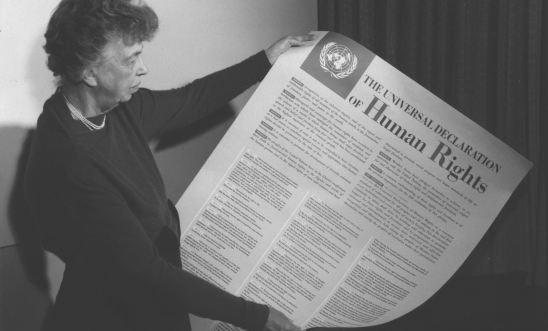"In some profound way, beyond all his reasons and his experience, he was no more than an egoist - he had what I had always detected, and loathed, in Conservative philosophy... the belief that the fortunate must at all costs be allowed to retain their good fortune"― John Fowles, Daniel Martin
THE HIPPOCRATIC OATH&THE UDHR; HOW DID THE MEDICAL STAFF RESPOND TO THE COVID-19 PANDEMIC

- THE HIPPOCRATIC OATH
The Hippocratic Oath is perhaps the most widely known of Greek medical texts. It requires a new physician to swear upon a number of healing gods that he will uphold a number of professional ethical standards. It also strongly binds the student to his teacher and the greater community of physicians with responsibilities similar to that of a family member. In fact, the creation of the Oath may have marked the early stages of medical training to those outside the first families of Hippocratic medicine, the Asclepiads of Kos, by requiring strict loyalty.
Over the centuries, it has been rewritten often in order to suit the values of different cultures influenced by Greek medicine. Contrary to popular belief, the Hippocratic Oath is not required by most modern medical schools, although some have adopted modern versions that suit many in the profession in the 21st century. It also does not explicitly contain the phrase, "First, do no harm," which is commonly attributed to it. (https://www.nlm.nih.gov/hmd/greek/greek_oath.html)
- THE UDHR
The Universal Declaration of Human Rights (UDHR) is a document that acts like a global road map for freedom and equality - protecting the rights of every individual, everywhere. It was the first time countries agreed on the freedoms and rights that deserve universal protection in order for every individual to live their lives freely, equally and in dignity.
The UDHR was adopted by the newly established United Nations on 10 December 1948, in response to the "barbarous acts which [...] outraged the conscience of mankind" during the Second World War. Its adoption recognised human rights to be the foundation for freedom, justice and peace.

Work on the UDHR began in 1946, with a drafting committee composed of representatives of a wide variety of countries, including the USA, Lebanon and China. The drafting committee was later enlarged to include representatives of Australia, Chile, France, the Soviet Union and the United Kingdom, allowing the document to benefit from contributions of states from all regions, and their diverse religious, political and cultural contexts. The UDHR was then discussed by all members of the UN Commission on Human Rights and finally adopted by the General Assembly in 1948.
The Declaration outlines 30 rights and freedoms that belong to all of us and that nobody can take away from us. The rights that were included continue to form the basis for international human rights law. Today, the Declaration remains a living document. It is the most translated document in the world. (https://www.amnesty.org/en/what-we-do/universal-declaration-of-human-rights/)
Article 19
Everyone has the right to freedom of opinion and expression; this right includes freedom to hold opinions without interference and to seek, receive and impart information and ideas through any media and regardless of frontiers.
Article 19, thus, claims that every person should be entitled to their right to freedom of speech. Nevertheless, hospitals like The NYU Langone Health , have warned employees they could be terminated if they talk to the media without authorization and prohibits them to tell the public the truth about their actual facilities. Their right to expression is limited and not only does this interfere with the Article 19 of UDHR, but it also prevents medical staff from improving the situation for the sake of their patients.
Article 22
Everyone, as a member of society, has the right to social security and is entitled to realization, through national effort and international co-operation and in accordance with the organization and resources of each State, of the economic, social and cultural rights indispensable for his dignity and the free development of his personality.
As every member of the society has the right to social security, hospitals should provide them with what is in their best interests and for the benefit of their well-being and not act in ways that may place patients in danger in order to preverse their own image.
Article 29
In the exercise of his rights and freedoms, everyone shall be subject only to such limitations as are determined by law solely for the purpose of securing due recognition and respect for the rights and freedoms of others and of meeting the just requirements of morality, public order and the general welfare in a democratic society.
Similar to articles 19 and 22, article 29 focuses on the security of citizens. However, the public is subjected to limitations that are determined by law not solely for the purpose of securing, but for a whole different selfish purpose. Authorities do not follow what is beneficial and safe to people, but place administrative dictates and power over medical and reasonable judgement.
- THE MEDICAL STAFF'S RESPONSE TO THE COVID-19 PANDEMIC
At least two health care workers have been fired after speaking out about the need for more coronavirus tests and protective equipment as hospitals across the country warn doctors and nurses not to publicize pandemic-fueled shortages of medical supplies.
An emergency room doctor in Washington state was fired last week after criticizing working conditions at his hospital where he had worked for 17 years, and a Chicago nurse was fired after warning colleagues their assigned masks offered inadequate protection against coronavirus, according to reports.
"Nurses and other health care workers are being muzzled in an attempt by hospitals to preserve their image," said Ruth Schubert, a spokesperson for the Washington State Nurses Association. "No health care worker should face being disciplined or fired for speaking the truth." A similar warning was issued by NYU Langone Health in New York City, according to Bloomberg News.
"I'm hearing widespread stories from physicians across the country and they are all saying: 'We have these stories that we think are important to get out, but we are being told by our hospital systems that we are not allowed to speak to the press, and if we do so there will be extreme consequences," Nisha Mehta, a radiologist in Charlotte, N.C., told Bloomberg, adding that many doctors are receiving "daily emails" about hospital gag orders."The public needs to hear these stories and other physicians need to hear them to be warned against what's coming," Mehta added. "It's so important that everyone understands how bad this is going to get."
Hospital administrators say the measures have been taken to protect patient privacy. However, health care workers like Ming Lin, an emergency room doctor at PeaceHealth St. Joseph Medical Center in Bellingham, argue that sounding the alarm about unsafe working conditions is part of the doctor's credo.
"Our oath is to do no harm," Lin told Bloomberg. "I spoke out for patient safety and as a result I got terminated."
More articles:
"People who fit don't seek. The seekers are those that don't fit."― Shannon L. Alder
The act of falling in love can be one of the most alluring, bewildering, seductive and ultimately dangerous experiences that can happen to a person. Writers, poets, and philosophers have attempted to define what it means to fall in love and how it comes to manifest itself for centuries, without much overall success or agreement.
One highly popular...



